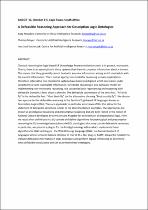JavaScript is disabled for your browser. Some features of this site may not work without it.
- ResearchSpace
- →
- Research Publications/Outputs
- →
- Conference Publications
- →
- View Item
| dc.contributor.author |
Moodley, K

|
|
| dc.contributor.author |
Meyer, T

|
|
| dc.contributor.author |
Varzinczak, IJ

|
|
| dc.date.accessioned | 2012-11-23T08:56:36Z | |
| dc.date.available | 2012-11-23T08:56:36Z | |
| dc.date.issued | 2012-10 | |
| dc.identifier.citation | Moodley, K, Meyer, T and Varzinczak, IJ. A defeasible reasoning approach for description logic ontologies. SA Institute for Computer Scientists and Information Technologies (SAICSIT) Conference, Pretoria, South Africa, 1-3 October 2012 | en_US |
| dc.identifier.isbn | 978-1-4503-1308-7 | |
| dc.identifier.uri | http://dl.acm.org/citation.cfm?id=2389845 | |
| dc.identifier.uri | http://hdl.handle.net/10204/6366 | |
| dc.description | Copyright: 2011 ACM. This is an ABSTRACT ONLY. The definitive version can be found at http://dl.acm.org/citation.cfm?id=2389845 | en_US |
| dc.description.abstract | Classical reasoning for logic-based KR (Knowledge Representation) systems is in general, monotonic. That is, there is an assumption in these systems that there is complete information about a domain. This means that they generally cannot deal with any new information arising which contradicts with the current information. This is not an appropriate model for reasoning in many applications. Therefore, alternative non-monotonic systems have been investigated which can reason under uncertainty or with incomplete information. Defeasible reasoning is one particular model for implementing non-monotonic reasoning. It is concerned with representing and reasoning with defeasible (nonstrict) facts about a domain. The defeasible counterpart of the strict fact: “All birds fly” is the defeasible fact: “Most birds fly” (or the alternative phrasing “Birds usually fly”). We discuss two approaches for defeasible reasoning in the family of logicbased KR languages known as Description Logics (DLs). They are applicable to particular extensions of DLs that allow for the statement of defeasible sentences similar to the aforementioned examples. The approaches are known as prototypical reasoning and presumptive reasoning and are both rooted in the notion of Rational Closure developed by Lehmann and Magidor for an extension of propositional logic. Here we recast their definitions in a DL context and define algorithms for prototypical and presumptive reasoning for DL knowledge bases (also called DL ontologies) that may contain defeasible sentences. In particular, we present a plug-in for the Protégé ontology editor which implements these algorithms for OWL ontologies - the Web Ontology Language (OWL) is a formal standard of languages whose semantic basis is identical to that of DLs. Our plug-in, RaMP, allows the modeller to indicate defeasible information in OWL ontologies and perform logical inferencing to determine what defeasible conclusions one can draw from these ontologies. | en_US |
| dc.language.iso | en | en_US |
| dc.publisher | ACM | en_US |
| dc.relation.ispartofseries | Workflow;9897 | |
| dc.subject | Computing methodologies | en_US |
| dc.subject | Artificial intelligence | en_US |
| dc.subject | Algorithms | en_US |
| dc.subject | Logic-based knowledge representation | en_US |
| dc.title | A defeasible reasoning approach for description logic ontologies | en_US |
| dc.type | Conference Presentation | en_US |
| dc.identifier.apacitation | Moodley, K., Meyer, T., & Varzinczak, I. (2012). A defeasible reasoning approach for description logic ontologies. ACM. http://hdl.handle.net/10204/6366 | en_ZA |
| dc.identifier.chicagocitation | Moodley, K, T Meyer, and IJ Varzinczak. "A defeasible reasoning approach for description logic ontologies." (2012): http://hdl.handle.net/10204/6366 | en_ZA |
| dc.identifier.vancouvercitation | Moodley K, Meyer T, Varzinczak I, A defeasible reasoning approach for description logic ontologies; ACM; 2012. http://hdl.handle.net/10204/6366 . | en_ZA |
| dc.identifier.ris | TY - Conference Presentation AU - Moodley, K AU - Meyer, T AU - Varzinczak, IJ AB - Classical reasoning for logic-based KR (Knowledge Representation) systems is in general, monotonic. That is, there is an assumption in these systems that there is complete information about a domain. This means that they generally cannot deal with any new information arising which contradicts with the current information. This is not an appropriate model for reasoning in many applications. Therefore, alternative non-monotonic systems have been investigated which can reason under uncertainty or with incomplete information. Defeasible reasoning is one particular model for implementing non-monotonic reasoning. It is concerned with representing and reasoning with defeasible (nonstrict) facts about a domain. The defeasible counterpart of the strict fact: “All birds fly” is the defeasible fact: “Most birds fly” (or the alternative phrasing “Birds usually fly”). We discuss two approaches for defeasible reasoning in the family of logicbased KR languages known as Description Logics (DLs). They are applicable to particular extensions of DLs that allow for the statement of defeasible sentences similar to the aforementioned examples. The approaches are known as prototypical reasoning and presumptive reasoning and are both rooted in the notion of Rational Closure developed by Lehmann and Magidor for an extension of propositional logic. Here we recast their definitions in a DL context and define algorithms for prototypical and presumptive reasoning for DL knowledge bases (also called DL ontologies) that may contain defeasible sentences. In particular, we present a plug-in for the Protégé ontology editor which implements these algorithms for OWL ontologies - the Web Ontology Language (OWL) is a formal standard of languages whose semantic basis is identical to that of DLs. Our plug-in, RaMP, allows the modeller to indicate defeasible information in OWL ontologies and perform logical inferencing to determine what defeasible conclusions one can draw from these ontologies. DA - 2012-10 DB - ResearchSpace DP - CSIR KW - Computing methodologies KW - Artificial intelligence KW - Algorithms KW - Logic-based knowledge representation LK - https://researchspace.csir.co.za PY - 2012 SM - 978-1-4503-1308-7 T1 - A defeasible reasoning approach for description logic ontologies TI - A defeasible reasoning approach for description logic ontologies UR - http://hdl.handle.net/10204/6366 ER - | en_ZA |






